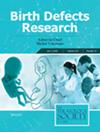The primary objective of this study was to assess associations between maternal reports of diarrhea during early pregnancy and a range of different birth defects, most of which have not been assessed in previous studies. The secondary objective was to determine whether associations were modified by maternal use of multivitamins.
We analyzed data on 16,675 mothers who participated in the National Birth Defects Prevention Study (NBDPS) and delivered between 2006 and 2011. Logistic regression was used to evaluate associations between maternal report of diarrhea during the periconceptional period and 32 categories of birth defects. Odds ratios were adjusted for nine covariates.
Eleven percent of women reported having diarrhea during the periconceptional period. We observed elevated associations (p < 0.10) between maternal report of diarrhea lasting 1–5 days and 9 of 32 independent categories of birth defects (hypoplastic left heart, muscular ventricular septal defect, single ventricle complex, secundum atrial septal defect, esophageal atresia, diaphragmatic hernia, omphalocele, gastroschisis, and amniotic band syndrome). The elevated adjusted odds ratios (aORs) ranged from 1.45 to 2.62. There were no decreased associations between maternal report of diarrhea lasting 1–5 days and any of the 32 birth defects. There was no evidence for a significant linear trend of stronger associations between maternal diarrhea and birth defects among mothers who had inadequate or suboptimal use of multivitamins.
Our results are consistent with modest associations between shorter, but not longer, bouts of maternal diarrhea and specific categories of birth defects. These results add to existing evidence, suggesting maternal diarrhea and gastrointestinal infections during early pregnancy are associated with a higher frequency of some birth defects.


